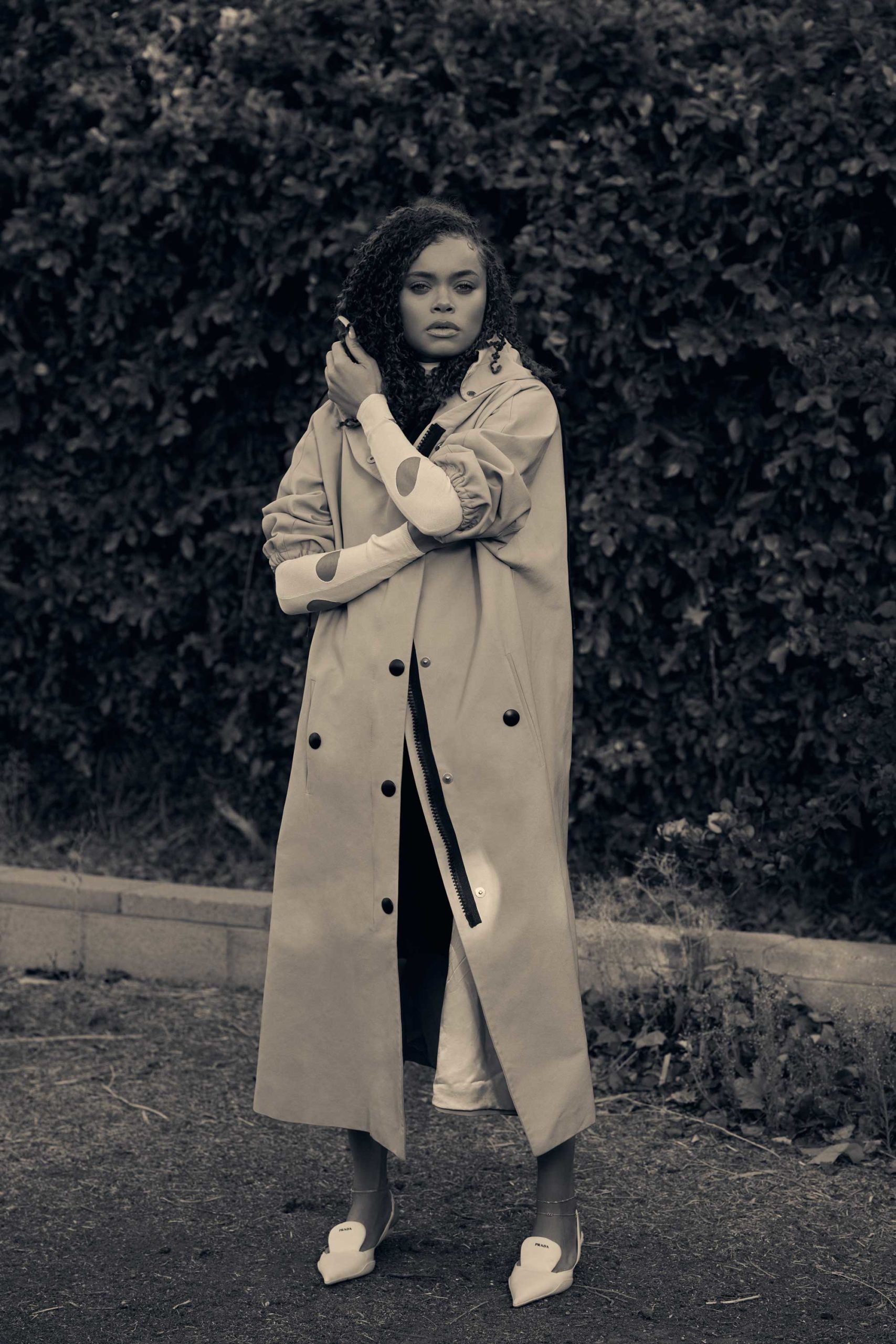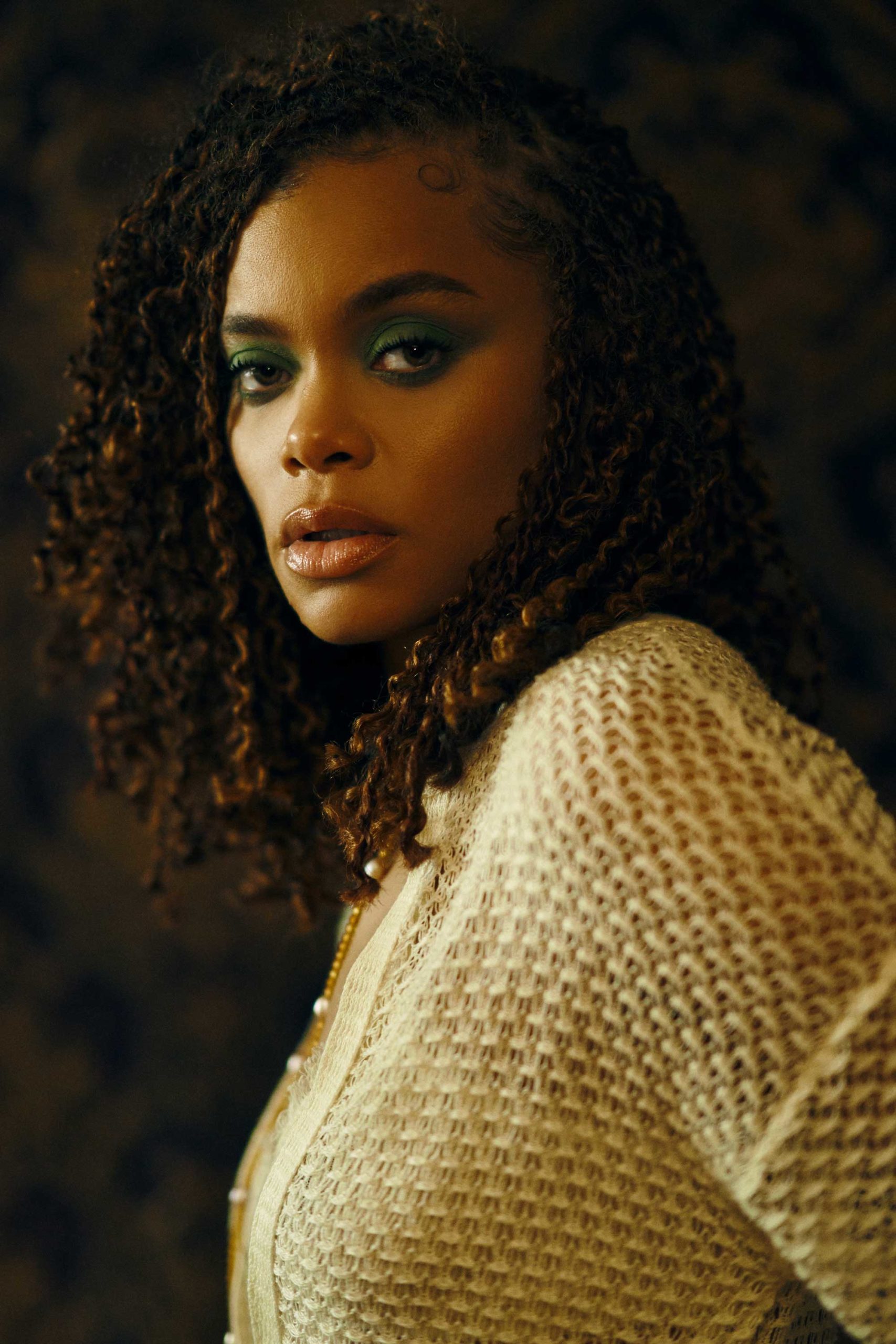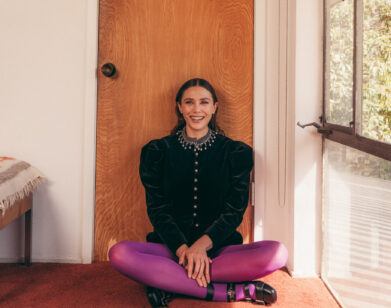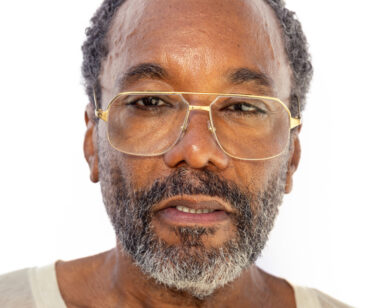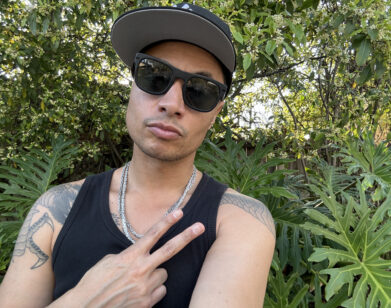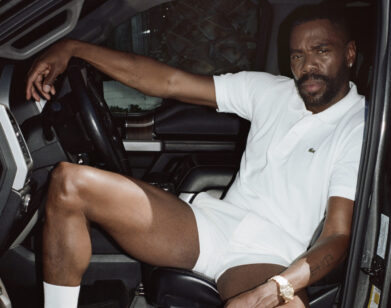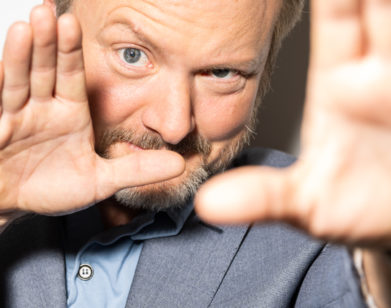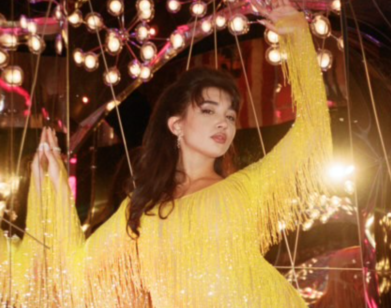arrival
Andra Day Tells Natasha Lyonne How She Became Billie Holiday
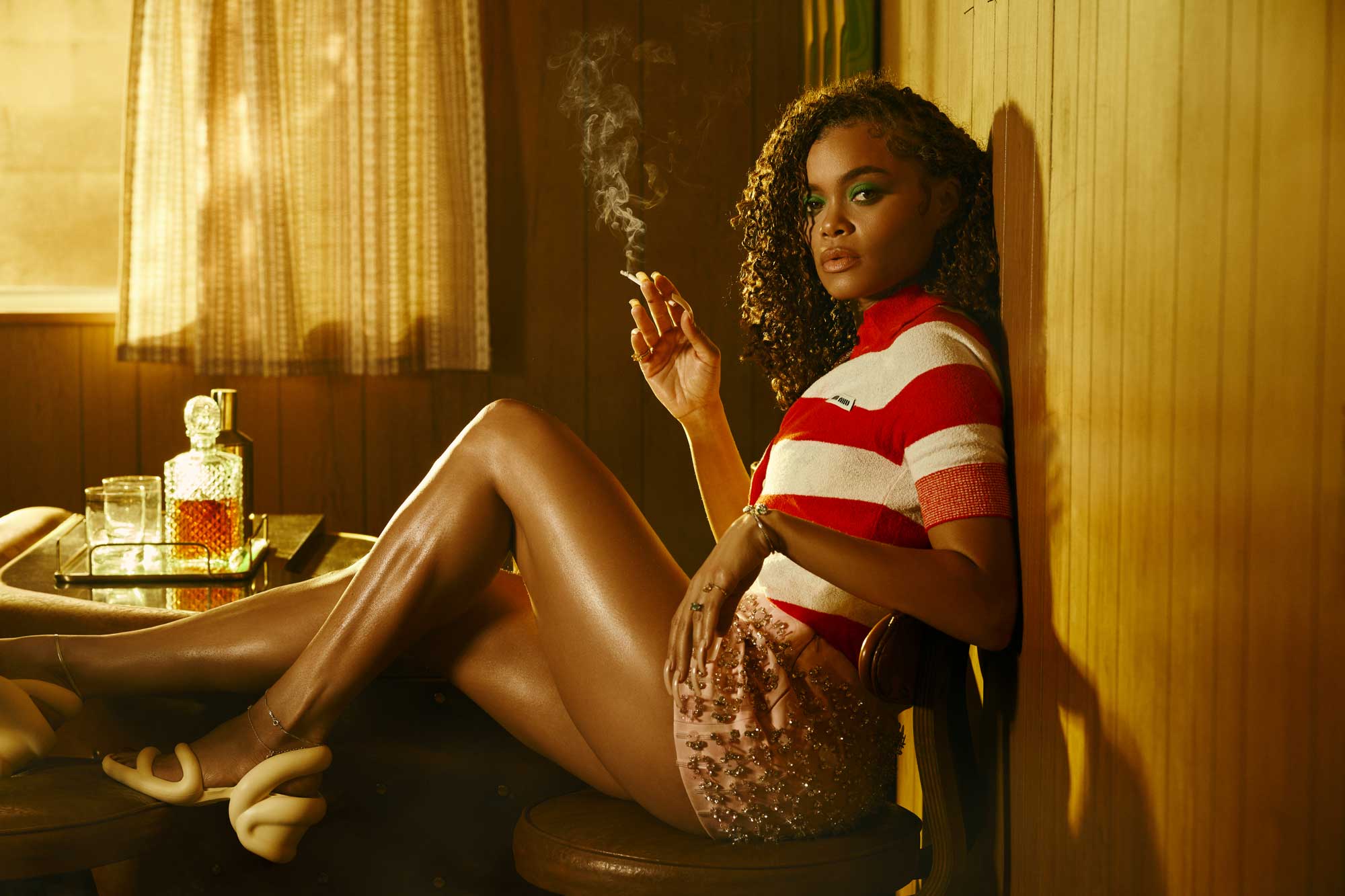
Shirt and Skirt by Miu Miu. Necklace by D’Orazio. Earring and Rings by Mateo. Bracelet by Bvlgari. Anklets (worn throughout) Andra’s Own. Shoes by Camper.
The decision to play Billie Holiday was not one that Andra Day made lightly. The Grammy-nominated musician, who recently sang her hit song “Rise Up” at Joe Biden’s inaugural parade, is no stranger to performance, but making her feature film debut as the iconic jazz entertainer during the most tumultuous period of her life called for a harrowing level of commitment. The United States vs. Billie Holiday, a biopic directed by Lee Daniels and adapted by the Pulitzer Prize–winning playwright Suzan-Lori Parks from Johann Hari’s book Chasing the Scream: The First and Last Days of the War on Drugs, tells the story of the Federal Bureau of Narcotics’s attempt to block the singer, who struggled with heroin addiction, from performing the anti-lynching song “Strange Fruit” and integrating Black and white audiences during the fight for civil rights. Day, a 36-year-old devoted Christian who grew up in San Diego, lost nearly 40 pounds and took up drinking, smoking, and swearing to help her inch closer to the trauma that led to Holiday’s addictions. Her approach to inhabiting Holiday was so all-encompassing, in fact, that when her costar Natasha Lyonne called her up to discuss their new film, it was the first time she heard her natural voice.
———
NATASHA LYONNE: Hello, angel.
ANDRA DAY: Hi, love. How are you?
LYONNE: Alive and on fire, my friend. This is maybe the first time I’ve heard your real voice. Is that possible?
DAY: It’s definitely possible. One of the things I said on set when everybody was like, “We’re going to see each other again,” was, “Yeah, this isn’t really me.”
LYONNE: It’s pretty wild. Having finally seen the movie, you are extraordinary. It’s truly insane to think this was your first film. As somebody who’s been around a long time, I don’t know that I’ve ever seen somebody so method in my entire career.
DAY: You had a lot to do with that. The first scenes I shot were with you, and I was thinking to myself, “I’m so glad it’s with her,” because you are a monstrous talent. It was really cool to be in the trenches with you. I would just watch your gestures and moves and be like, “Okay, that’s how I need to hit it.” And you were my smoking instructor, so I appreciate that.
LYONNE: I really should be credited as the Smoking Coach.
DAY: I’m starting to get back to myself, but I spent a lot of time in her headspace. Right now, I’m just trying to figure out how much of Billie Holiday is going to stay with me forever. Like, will I ever stop cussing? But even though we are definitely not the same, we share similarities. I’m still a Black woman. I still live in America. I grew up and saw some things. And as a woman, we all have a share of emotional, sexual, verbal, physical abuse or trauma, particularly when it comes to men. But generally speaking, I don’t smoke cigarettes and I didn’t historically cuss or drink or even have sex.
LYONNE: It’s so rare in this life that you actually see someone able to access their own trauma and reroute it into another human being so beautifully. It was revelatory.
DAY: I will say, when I was on set doing it, it was not only about accessing the emotion, but then holding onto it. That was the thing I kept hearing: “Now that you’ve drummed it up, hold onto it and don’t let it go.” Originally, LaKeith [Stanfield] was attached to the project, and I texted him from the set like, “Yo, you acting muthafuckas are on some other next-level living experience.” I just remember thinking, “Damn, this is what they do every time they’re in a movie.” The fact that you have to live with that much in your chest and in your head and in your being and in your spirit, it was probably the hardest thing I’ve ever had to do in my life, as far as work goes.
LYONNE: Do you remember the first time you heard “Strange Fruit”? Or anything else by Billie Holiday?
DAY: Oh, yeah. I was 11 years old, going to a performing arts school, and looking for singers to study. My musical theater teacher said to me, “Look at Billie Holiday,” and I remember being like, “Huh? I asked you for female singers. Who the hell is this dude Billie Holiday?” And then I went and listened, and I was completely confused by her voice, almost to the point where I was like, “I’m uncomfortable with this. It doesn’t sound anything like Whitney Houston or Aretha Franklin or Etta James.” But I found myself unable to stop playing it. When I heard “Strange Fruit” at that age, it knew it was really important. I knew I felt a connection to it, but I didn’t fully understand what she was talking about. All I knew was that I could hear sacrifice in it.

.Shirt and Bra by Nina Ricci. Skirt and Shoes by Chloe. Earrings and Ring by Mateo. Necklace by Clash de Cartier. Watch by Maillon de Cartier. Bracelet by Panthere de Cartier.
LYONNE: Can you tell me about the process of being cast in the movie and what ran through your mind when you found out you would be playing Billie Holiday?
DAY: It was basically a journey of me trying to figure out how to get the fuck out of it. I was so scared. This is how it happened: Lee [Daniels]’s manager told Lee he should consider me for it. Lee was like “Absolutely not. That is a terrible idea.” My manager said the same thing, And yet somehow we were sort of forced upon each other. I think the first thing we bonded over was that neither of us thought we should be there. He was not wanting to do it, and I was like, “Listen, this is a bad idea, bro. I’m not an actress. You should definitely figure out how to get out of this.” But then we started talking about Billie. We bonded over our love for her. One of my initial hesitations was that I didn’t have any desire to remake Lady Sings the Blues [the 1972 Billie Holiday biopic starring Diana Ross] because Diana had done such a phenomenal job in that role. But once I spoke to Lee and saw the script, I saw that it wasn’t a remake. We were going to tell the truth about how the government went after her, we were going to tell the truth about the first War on Drugs and how its genesis was race, and we were going to vindicate her legacy. After that meeting, I did several auditions and got the gig at the beginning of 2018. He called me to tell me I got the job, and I was like, “Are you sure you looked at everybody?” He was like, “Yo, shut up, please come to the movie set,” and I was like, “Okay.”
LYONNE: It really is the ultimate leap of faith to take on something of this scope. Usually a movie takes three months, maybe six months, but in this case, because you also did all the music for it, it was closer to two or three years that you had to stay living inside Billie Holiday. Is that right?
DAY: That timeline is spot-on. I started preparing with my acting coach Tasha [Smith] at the end of 2017. I got the role at the top of 2018, and we didn’t start filming until October of 2019. The finality of it came at the end of 2020.
LYONNE: Do you find yourself unlearning her habits and her tics?
DAY: When I first got back, it was really fucking difficult. I didn’t want to let her go. I didn’t want to leave Montreal. I didn’t want to leave the movie set. I didn’t want to leave Lee. I didn’t want to leave you guys. I didn’t want to leave the magic of that place and that moment. It’s been difficult unlearning her.
LYONNE: As an addict in recovery, reading Johann Hari’s book Chasing the Scream: The First and Last Days of the War on Drugs, which inspired the script, was harrowing. I wept reading it because of how cruel and misunderstood addiction is, and how brutal it is as a racial tool in this country, and just how misshapen and rotten to the core the entire fucking War on Drugs is. And even learning about the formation of the FBN [Federal Bureau of Narcotics] and [the FBN commissioner] Harry Anslinger and the way they go after Billie. Around the same time, Judy Garland was a known heroin addict as well, and they just call her into the office and say, “Don’t worry, we’ll take care of you.” We see the opposite happen with Billie Holiday, and it’s so fucking cruel. And it is the legacy of this entire country that is obviously still happening to this day with the prison-industrial complex. How on earth did you go about researching playing an addict and integrating that information? For me, that would have been very easy. For you, not so much.
DAY: That was a huge thing for me. I was like, “I don’t want to just look like a convincing heroin addict. I want to know why. What makes me need to slam heroin? What makes me, without even thinking, pick up a cigarette and light up? I sat with a lot of heroin addicts. I sat with recovering addicts, and I sat with this really, really wonderful man who owns a rehab center, who’s been clean and sober for 25 years. And so, I wanted to know, “When you need to score, what is that? When you’ve actually scored and you’re cooking, what’s that focus like?” It’s like somebody saying to you, “I have one pill that would make every mistake you’ve made—every loss, every tragedy, every ounce of guilt and shame, every time you’ve been sexually abused or raped, or every time you’ve felt less-than, the racism, the pain of your people being lynched—go away. When you look at it like that, you’re like, “Well, fuck, why wouldn’t I take that?” We take medicine for our physical pain, but a drug that can make all of your emotional pain go away and make you feel good from head to toe, inside and out, think about how hard that pain hits when you come down. They helped me to understand that you’re only getting high, really, the first time. It’s very rare you’ll ever have that again. Most of the time, you’re just trying to stave off dope sickness. You’re trying to put the battery in your back to be able to function and hopefully not die.
LYONNE: You’re breaking my heart, because that’s what’s so devastating about the book and about Billie Holiday and about addicts around the world. It’s just so real, the idea of this magic elixir that can make it all okay, and that can, of course, take over a life and just decimate it. And to then be punished for it. Essentially, you’re criminalizing trauma and pretending it’s criminalizing addiction. It’s just devastating, because people need help, not prison.
DAY: You actually really helped me understand addiction with the most simple phrase. I don’t know if you even remember saying it, but we were hanging out, and you said that people talk about the willingness of addicts to do certain things in order to get their drugs, which feels very narcissistic. But it’s not narcissistic in the way that we know. You explained it to me as not, “I’m so great,” but rather, “I’m the biggest piece of shit at the center of the universe.” Those are the exact words you said to me, and I remember writing them down in my notebook. It was such a concise way to sum it all up for me.
LYONNE: I think people sometimes get it upside down and backwards, as if it’s a selfish act for kicks or something. It’s actually for survival. It’s that twisted thing where you’re killing yourself in order to survive. What do you hope people take from Billie’s story?
DAY: I want people to look at this film and to thank god for her, as I do, because she truly was the godmother of civil rights. It was the death of Emmett Till, but it was also Billie Holiday singing “Strange Fruit,” that reinvigorated the movement. We needed her. I also want to continue her fight, which means telling the truth about her. There’s a reason you didn’t know this story. There’s a reason you did not know the story of the early War on Drugs. There’s a reason people think time just took its toll and no one knows her story anymore. No, they were getting rid of images and footage. Their goal was to wipe her out of the history books, but she was far too famous. So the next step was to say, “If we can’t do that, then we’ll turn her into a tragic drug addict that no one should want to be like or look up to.” And that, unfortunately, was successful. Bryan Stevenson’s book Just Mercy about the Equal Justice Initiative says this a lot: “The North won the Civil War, but the South won the narrative war.” The narrative war is what allows systems of oppression to persist today. If we don’t know people’s true stories, then we can’t truly appreciate them. You can still hate somebody, but it’s difficult to truly hate someone when you know the depths of their struggle and their trauma, and when you know the breadth of their contribution. Billie’s story is one of those stories. We were never supposed to know that she was a martyr in the War on Drugs, which was really just a war on people of color. We weren’t supposed to know that she was standing up for people, that she gave her life to do what’s right and tell the truth. We weren’t supposed to know that she was integrating audiences, that people of all races loved her and were drawn to her. So after people see this movie, I want them to ask, “What other stories are we not supposed to know?”
———
Hair: Tony Medina
Makeup: Porsche Cooper
Set Design: David Browne
Digital Technician: Pamela Grant
Manicure: Joelene Brodeur using Chanel
Photography Assistants: Jesse Belvin and Clark W.
Fashion Assistant: Andrew MC Farland

